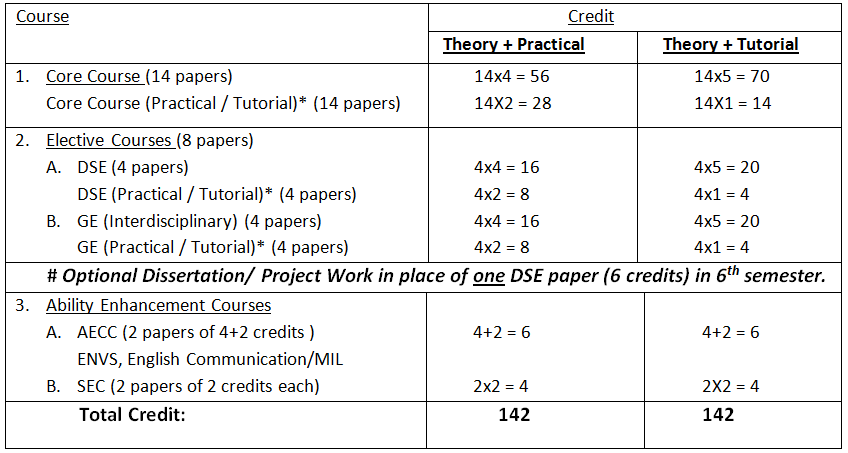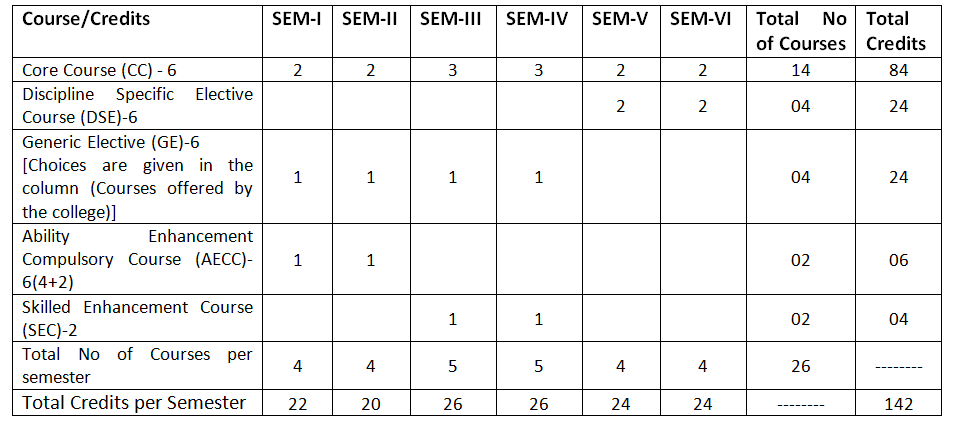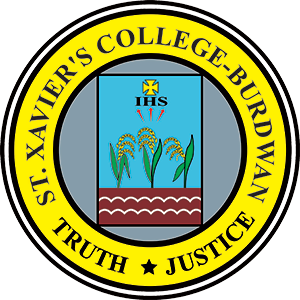DRAFT OUTLINE OF THE
SEMESTER WISE COURSE STRUCTURES OF B.A. /B.Sc. /B.Com. UNDER THE CHOICE BASED
CREDIT SYSTEM ( CBCS )
The
main components of the Honours courses
under the CBCS are as follows:
1. Core Course: A course,
which should compulsorily be studied by a candidate as a core requirement, is
termed as a core course.
2. Elective Course : Generally a course, which can be chosen
from a pool of courses and which may be very specific or specialized or
advanced or supportive to the discipline/subject of study or which provides an
extended scope or which enables an exposure to some other discipline/ subject/
domain or nurtures the candidate’s proficiency/ skill, is called an Elective
Course.
2.1
Discipline
Specific Elective (DSE) Course:
A course, which may be offered by the main discipline/ subject of study,
is referred to as Discipline Specific Elective.
2.2
Generic Elective (GE) Course: An
elective course, chosen generally from an unrelated discipline/ subject of
study with an intention to seek an exposure, is called a Generic Course.
N.B. - A Core Course, offered in a discipline/
subject, may be treated as an elective by other discipline/ subject and vice-versa
and such electives may also be referred to as Generic Elective.
2.3
Dissertation/Project: An
elective course, designed to acquire special/ advanced knowledge, is termed as
dissertation/ project. This is considered as a special course involving
application of knowledge in solving/ analyzing / exploring a real life
situation/ difficult problem. A dissertation/ project work will be of 6
credits. A dissertation/ project work may be given in lieu of a Discipline
Specific Elective.
3. Ability Enhancement Courses (AEC) :
The Ability Enhancement (AE) Courses may be of two kinds- Ability
Enhancement Compulsory Courses (AECC) and Skill Enhancement Course (SEC).
3.1
AECC: These are the courses based on the
contents that lead to knowledge enhancement and consist of Environmental
Studies & English/ MIL Communication. These are mandatory for all
disciplines.
3.2
SEC: SEC
are value-based and/or skill-based and are aimed at providing hand-on-training,
competency, skill, etc. It will be minimum 2 for Honours Courses and 4 for
General Courses. These may be chosen from a pool of courses designed to provide
value-based and/or skill-based knowledge and would contain both theory and lab.
/ hands-on-training/ field work. The main purpose of these courses is to
provide the students life-skill in hands-on-mode so as to increase their employability.
4. Practical/Tutorial: One
each with every Core, Discipline Specific and Generic Elective Paper.
5. Course
Structure ( Honours )
|
Course Components |
B.Sc. Honours |
B.A. Honours |
B.Com. Honours |
|
Core Course ( CC ) |
14 |
14 |
14 |
|
Discipline Specific Elective ( DSE )
Course |
4 |
4 |
4 |
|
Generic Elective ( GE ) Course |
4 |
4 |
4 |
|
Ability Enhancement Compulsory Course
( AECC ) |
2 |
2 |
2 |
|
Skill Enhancement Course ( SEC ) |
2 |
2 |
2 |
Details of Courses of B.A./ B.Sc./ B.Com. ( Honours ) under CBCS

An Under-graduate Honours Degree in
a discipline may be awarded if a student completes 14 core papers in that discipline,
4 papers each from a list of DSE and GE respectively, 2 papers in AECC and
minimum 2 papers in SEC.
*
Wherever there is a practical, there will be
no tutorial and vice-versa
The evaluation of the candidates shall be based on
continuous assessment. The structure of evaluation shall be as follows:
i)
Each semester- assessment shall be divided into three
(3) discrete components, viz. C1, C2 and C3.
The students will be informed about the modalities of continuous assessment
activities well in advance. The first component (C1) of assessment
shall be of 10% of the total marks of each course of a semester and will be
based on class attendance, class test or assignment or seminar. During the
first two months of each semester, 1/3 of the syllabus will be completed. The
continuous assessment of C1 will be consolidated during the 8th
week of the concerned semester. The second component (C2) of
assessment shall be of 10% of the total marks of each course of a semester and
will be based on class attendance, class test or assignment or seminar. During
the second two months of each semester, 2/3 of the syllabus will be completed.
The continuous assessment of C2 will be consolidated during the 16th
week of the concerned semester. Appearance in C1 & C2
is mandatory.
ii) During
the 21st – 23rd weeks of a semester, a Semester- end
Examination shall be conducted for each course and the proportion of C3
will be 80% of the total marks each course of the semester.
iii) The
result of each course in a semester shall be based on the values of C1,
C2 & C3 and shall be awarded in form of grade point.
Mechanism of computation of
work-load per week:
i)
1 Credit = 1 Theoretical class of 1- hour
duration
ii)
1 Credit = 1 Tutorial class of 1- hour duration
iii)
1 Credit = 1 Practical class of 2- hour duration
Semester wise distribution of courses and credits according to CBCS (Choice Based Credit System) pattern

Full marks of a course, having 6
credits/ 2 credits, along with distribution of marks:
1.
Full marks of each course of B.A./ B.Sc./ B.Com.
(Hons.), carrying 6 credits, be 75
2.
Full marks of each course of B.A./ B.Sc./ B.Com.
(Hons.), carrying 2 credits, be 50
3. For B.A. & B.Com. (Hons.) Courses, having no practical, distribution
of 75 marks be as follows:
i)
Class Attendance cum Internal Assessment:
20% of 75 marks = 15 marks of which 5 marks be reserved for class attendance
(both theoretical + tutorial) in the following manner:
Attendance 50% & above but below 60% - 2 marks
Attendance 60% & above but below 75% - 3 marks
Attendance 75% & above but below 90% - 4 marks
Attendance 90% & above - 5 marks
and
10 marks be reserved for class test/ assignment/ seminar (theoretical – 5 &
tutorial – 5). Minimum 15 classes be allotted for tutorial portion.
ii)
In the Semester-end-Examination of each
course, Question paper be set for 60 marks, distribution of which may under:
a)
Answer 10 questions out of 15 carrying 02 marks
each = 10 x 02 = 20
b)
Answer 04 questions out of 06 carrying 05 marks
each = 04 x 05 = 20
c)
Answer 02 questions out of 04 carrying 10 marks
each = 02 x 10 = 20
However, questions, carrying 05
or 10 marks, need not necessarily to be a single question.
4. For B.Sc. (Hons.) Courses, having practical, distribution of 75 marks be as follows:
i)
Class Attendance cum Internal Assessment:
20% of 75 marks = 15 marks of which 5 marks be reserved for theoretical class
attendance in the following manner:
Attendance 50% & above but below 60% - 2 marks
Attendance 60% & above but below 75% - 3 marks
Attendance 75% & above but below 90% - 4 marks
Attendance 90% & above - 5 marks
and
10 marks be reserved for class test/ assignment/ seminar (theoretical – 5 &
practical – 5).
ii)
20 marks be allocated for Semester-end-Practical
Examination of each course, distribution of which may be as under:
a)
Lab. Note Book : 05 Marks
b)
Viva-voce : 05 Marks
c)
Experiment
: 10 Marks
Or, as may be decided by the concerned Board of Studies.
iii)
40 marks be allocated for Semester-end-Theoretical
Examination of each course, distribution of which may be as under:
a)
Answer 05 questions out of 08 carrying 02 marks
each = 05 x 02 = 10
b)
Answer 02 questions out of 04 carrying 05 marks
each = 02 x 05 = 10
c)
Answer 02 questions out of 04 carrying 10 marks
each = 02 x 10 = 20
However, questions, carrying 05
or 10 marks, need not necessarily to be a single question.
5.
For B.A.
& B.Com. (Hons.) Courses, having
practical, distribution of 75 marks be as under:
a)
i) In
case of ‘Fully Practical’ based
course, Class Attendance cum Internal Assessment : 20% of 75 marks = 15
marks of which 5 marks be reserved for practical class attendance in the
following manner:
Attendance 50% & above but below 60% - 2 marks
Attendance 60% & above but below 75% - 3 marks
Attendance 75% & above but below 90% - 4 marks
Attendance 90% & above - 5 marks
and
10 marks be reserved for class test/ assignment.
ii)
60 marks be allocated for Semester-end-Practical
Examination of each course, distribution of which may be as under:
Viva-voce : 10 Marks, Experiment : 50 Marks
b)
i) In case of a course, containing theory and practical, Class Attendance cum Internal
Assessment : 20% of 75 marks = 15 marks of which 5 marks be reserved for theoretical
class attendance in the following manner:
Attendance 50% & above but below 60%
- 2 marks
Attendance 60% & above but below 75%
- 3 marks
Attendance 75% & above but below 90%
- 4 marks
Attendance 90% & above - 5 marks
and 10 marks be
reserved for class test/ assignment/ seminar (theoretical – 5 & practical –
5).
ii)
20 marks be allocated for Semester-end-Practical
Examination of each course, distribution of which may be as under:
Viva-voce : 05 Marks, Experiment : 15 Marks
iv)
40 marks be allocated for Semester-end-Theoretical
Examination of each course, distribution of which may be as under:
a)
Answer 05 questions out of 08 carrying 02 marks
each = 05 x 02 = 10
b)
Answer 02 questions out of 04 carrying 05 marks
each = 02 x 05 = 10
c)
Answer 02 questions out of 04 carrying 10 marks
each = 02 x 10 = 20
However,
questions, carrying 05 or 10 marks, need not necessarily to be a single question.
6. For B.Sc. (Hons.) Courses, having no practical, distribution of 75 marks, be same as
(3) above.
7.
In the Semester-end-Examination of AECC of B.A./ B.Sc./ B.Com., carrying 2
credits (i.e. full marks 50), MCQ be set and OMR sheet be used. Under AECC,
ENVS be taught in the 1st Semester and communicative Eng. / MIL be
taught in the 2nd Semester.
8. For B.A., B.Sc. & B.Com. (Hons.) Courses, distribution of 50 marks (for each SEC) be as follows:
i)
Internal Assessment : 20% of 50 marks = 10
marks be reserved for class test/ assignment/ seminar.
ii)
40 marks be allocated for Semester-end-Theoretical
Examination of each course, distribution of which may be as under:
a)
Answer 05 questions out of 08 carrying 02 marks
each = 05 x 02 = 10
b)
Answer 02 questions out of 04 carrying 05 marks
each = 02 x 05 = 10
c)
Answer 02 questions out of 04 carrying 10 marks
each = 02 x 10 = 20
However,
questions, carrying 05 or 10 marks, need not necessarily to be a single
question.
Distribution
of total marks (1850), equivalent to 140 credits, of all courses to be studied
by a student of B.A./ B.Sc./ B.Com. Hons.
CC :
75 x 14 = 1050
DSE : 75
x 4 = 300
GE :
75 x 4 = 300
AECC : 50 x 2 = 100
SEC : 50 x 2 = 100



